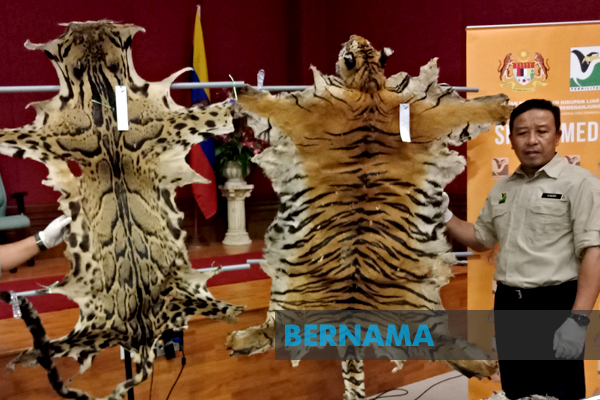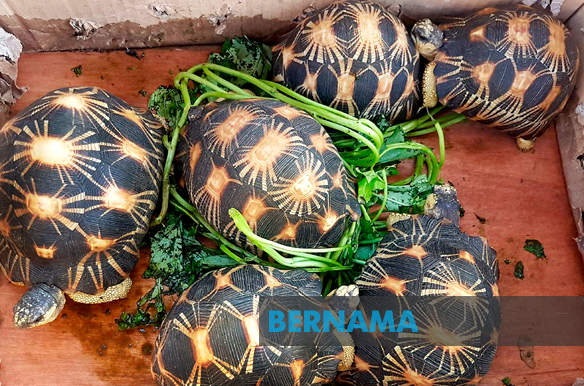Poaching accelerating extinction of protected species

By Ravindran Raman Kutty
Communications practitioner (Malaysia)
Kuala Lumpur: “An endangered pygmy elephant was found dead in Sabah. It had been shot 70 times and its tusks were hacked off during a brutal attack by poachers…” This was the first thing I heard when I switched on the radio one morning late last month.
My heart sank. Yet another poor animal has become the victim of merciless animal poachers.
In July, the people of a village in Terengganu were bewildered when they saw two tigers roaming freely in their village. Terengganu Department of Wildlife and National Parks director Dr Abdul Malek Mohd Yusof was quoted as saying by the media that the tigers’ tame behaviour suggested that they were kept as pets, and warned that any activity to keep, hunt, injure or provoke wildlife is an offence under the Second Schedule of the Wildlife Conservation Act 2010.
Throughout the years, during my daily commutes to work and travels across the country, I have seen many monkeys and various types of birds lying as carcasses on our busy roads, especially in rural areas.
Men are the biggest predators of wildlife species, which makes it extremely challenging for these creatures to coexist with us. In the Klang Valley, the development of Ampang serves as a good test case. Ampang is an exclusive urban enclave with macaques encroaching on the households and foraging for food.
My friend who is planning to move to Ampang is worried about how the macaque menace over there is being managed.
What is the role of the local authorities in managing this issue? Is the Forestry Department aware of this issue in Ampang? Can a concerted action plan be carried out to move these desperate and lost creatures to a safer place?
Wildlife poaching in Malaysia is increasing, and it’s worrying. This is a true reflection of man’s greed and lust. Greed, lust and unending desires of man will soon empty the world with none living, growing or multiplying. As eloquently observed by Indian nationalist Mahatma Gandhi, “The world has enough for everyone’s need, but not enough for everyone’s greed.”
Poaching is not a new phenomenon in Malaysia. Poaching activities over the past 100 years have wiped out the Sumatran rhinoceros species in the wild in Malaysia.
The trend now is to hunt any species with any perceived commercial value. People living near forests are also involved, sometimes serving as middlemen. National parks and protected areas are being targeted by these irresponsible humans due to their higher numbers of wildlife.
Almost any wild animal you can think of is poached, from tigers to sea cucumbers to butterflies. Our authorities often seize large numbers of birds and reptiles from animal traffickers.
Pangolins are also being wiped out at an alarming rate — on Feb 7, 2019, 30 metric tonnes of these creatures were seized in Kota Kinabalu, Sabah.

In terms of the adverse impact of poaching in Malaysia, tigers are down to less than 200 largely because of their body parts targeted by poachers.
The sambar and barking deer — the main prey of the tigers — are also heavily poached, which intensifies the big cats’ vulnerability to extinction. In Sabah, the situation is much more worrying because it is the only state housing the habitat of the pygmy elephant.
The illegal online wildlife trade largely involves young wild animals, including sun bears, gibbons, dusky leaf monkeys, leopard cats, slow loris and a variety of birds of prey.
In terms of the international poaching trade, Malaysia is a huge transhipment hub for elephant ivory, pangolin scales, tortoises and rhino horn from Africa.
The key reason for poaching is the demand for wildlife as pets (for example, rare and unique animals) and for medicinal purposes (bear bile, rhino horn and tiger bone). Tigers are also hunted for certain body parts which some people believe can be used as amulets.
Meanwhile, certain types of animals are ending up as exotic dishes at restaurants; ivory is being used to make decorative items; and deer heads for taxidermy purposes.
Poaching and illegal wildlife trade have reached a critical level across Southeast Asia. Our forests are littered with snares. The thing to keep in mind is that Malaysia stands to lose a lot if we cannot get a grip on the problem. And that’s because we have a lot of wildlife that still needs protecting.
Peninsular Malaysia’s wildlife laws are among the strongest in the region. Sabah recently amended its law, but Sarawak has a long way to go to catch up with the laws in Peninsular Malaysia and Sabah.
Every citizen must do the following to preserve wildlife:
- Don’t buy them. This is the most important and impactful action anyone can take to curb demand. You don’t need a baby bear or a baby dusky leaf monkey as a pet. Your life does not depend on it but the life of this animal depends on its freedom.
Say no to deer meat/protected wildlife meat. It will not make you stronger, better looking, smarter, faster or tougher. There are alternatives to wildlife-based medicines. Only the elephant needs ivory, no one else does.
- Educate yourself, your friends and family. Many people know someone who is breaking the law but wouldn’t call them out or suggest they do things differently. It’s time we act cohesively to stop animal poaching.
- Report wildlife crime. Contact the Wildlife Crime Hotline at 019-3564194 (for Malaysia only).
English broadcaster and natural historian David Attenborough observed that the natural world is in serious trouble. I couldn’t agree more. Animal poaching is, literally and figuratively, a life-and-death matter. Wildlife is a critical component of our life. They add colour, vigour, variety and beauty to nature in order for it to evolve.
For Budget 2020, our government made a step in the right direction by allocating RM83 million for the conservation of the wildlife population and protection of the nation’s rainforests.
Out of this allocation, RM15 million will be channelled to the Malaysian Conservation Alliance for Tigers (MyCat), Sepilok Orang Utan Rehabilitation Centre in Sabah and other non-governmental organisations for the protection of endangered animals in the country.
BERNAMA





















































